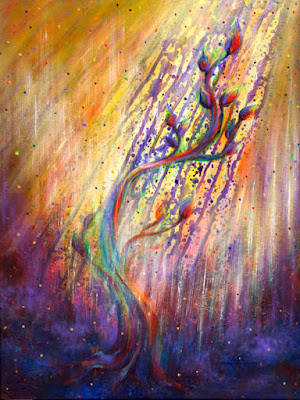An eye catching title, perhaps particularly ideal for those suffering from insomnia. But for anyone interested, the word "apokatastasis" is used within the Christian Religion for Universalism, the hope for the restoration of ALL things, for all people, for all creation.
This is not something that has arisen over the past few centuries, preached by those who have "fallen away" from "what the Church has always taught", an attempt to "corrupt the plain meaning of scripture." In fact it was a belief, a teaching, very prevalent in the Early Church, taught by several of the Early Church Fathers, taught throughout the Christian centuries, and now gathering pace among many whose fidelity to Christ is unquestionable. Names?
Origen, Macrina, Gregory of Nyssa, Isaac of Nineveh, Maximos the Confessor, Silouan the Athonite, and later, George MacDonald and the boldest minds of our era, Sergius Bulgakov, Robert W. Jenson, Thomas Talbott, Ilaria Ramelli, David Bentley Hart, John Behr.

Even the oft stated claim that the doctrine was declared heretical at one time is now called into question by scholars of the Christian Church.
Does any of this matter? Well, that depends upon each of us. I am a non-theist, and have little interest (or belief) in transcendent Beings, creators, any fall of humankind, and therefore of any restoration. The Dharma (Buddhism) avoids beginnings and conclusions, seeing allegiance to such things as being antithetical to the actual living of the "holy life", the path to the end of suffering.
Yet I have great regard for what is called a fully "incarnational" Christanity, of "Christ in us". It really goes without saying that if, in our mind/hearts, we have faith in the eventual restoration of "all things", every last one of us, then our own lives will begin to mirror, to reflect, the Reality of Healing that we trust is in us and around us. This as opposed to believing that eventually creation will be solidified into a two tier system, of "sheep" and "goats", lost and saved, heaven and hell - does it take much imagination to recognise just how a mind/heart will develop that sees things in such a way.
Being a non-theist I bring healing to my mind/heart in other ways. To be honest I find that belief in God is cloying and claustrophobic, and given in many ways a weak mind, easily led, the loud voices of the "believers" becomes discordant, a chorus of noise with little meaning, each convinced of their own pictures of Reality.

I've asked before about the "dividing line" between theism and non-theism, and in truth I think there isn't one. That said, some images of God are fairly remote to me. It seems pretty obvious that there will be no time when I am "here" and God is "there" - God is more the ground of Reality in which we "live and move and have our being". Yet I have heard a very well known Christian evangelist say that when "we walk into heaven the only difference we shall see between God the Father and God the Son will be the nail-prints in the Son's hands." This is crass, ridiculous, and yet points to the very literalist way every word in the Bible is interpreted - the word as text, rather than the Living Word. (Obviously, such a literalist grasp of certain things does not necessarily preclude an mind/heart from the fruits of the spirit)
From my own perspective "Buddha nature" points to the immanence, the liberative potential, in the ground of the earth, as well as in the inner, psychological ground of being, "ever ready to spring forth and benefit beings. It speaks of and represents the fertility of the earth itself and the wondrous, healing, natural power of Reality, or the phenomenal world."
The Dharma at best, combines soteriology, epistemology and ontology. As someone else has said:- Zen Buddhism developed and cannot be fully understood outside of a worldview that sees reality itself as a vital, ephemeral agent of awareness and healing.
As I see it we all move forward with our mental maps of the world, and within this mental map there are things we think are good, useful, or valuable, such as flowers, and there are other things we think are bad, useless, or worthless, such as weeds. Usually we take it for granted that the fabricated picture of the world in our minds is the world itself. Nothing really wrong with this, and yet our "maps" can become solid, set in concrete, used to "justify" ourselves, projected onto God, who then is deemed to judge the whole earth according to our dictates. This is tragic.
We are more a constant becoming - as Dogen says:-
"Flowers fade even though we love them, weeds grow even though we hate them."
As finite beings we simply can never really know, in a world of becoming, just which are flowers and which are weeds, and grasping at one and shunning the other, we can lock ourselves into a world that maybe can seem like heaven at times and yet is hell. Letting go of our conclusions and beliefs can be liberating, leaving the mind/heart to find ever greater intimacy with Reality - and to experience it (no matter how much "evidence" to the contrary) as truly healing, life-giving, and fulfilling.
And hopefully we ourselves can mirror Reality, reflect it, be a source of healing to others.


































